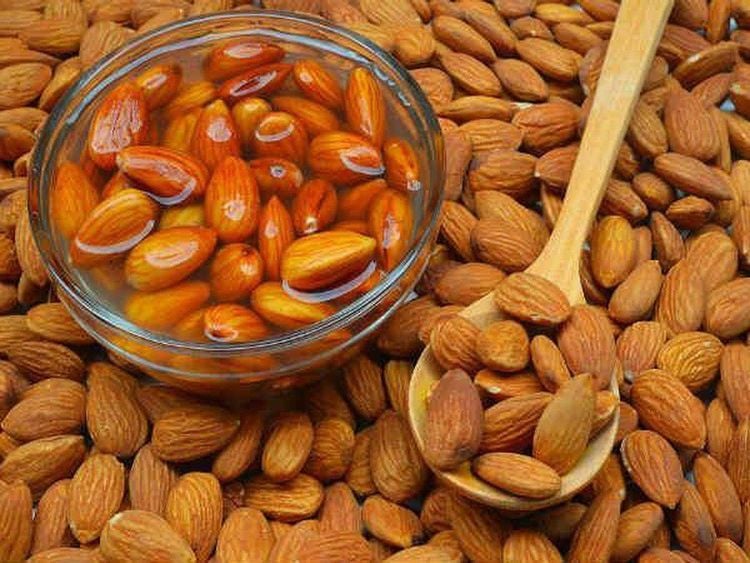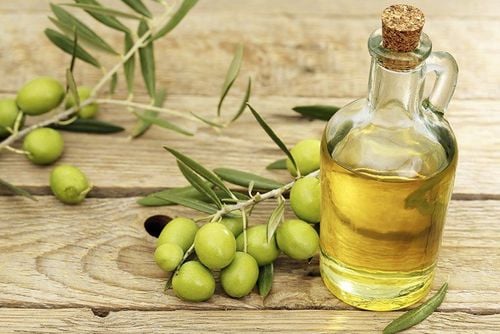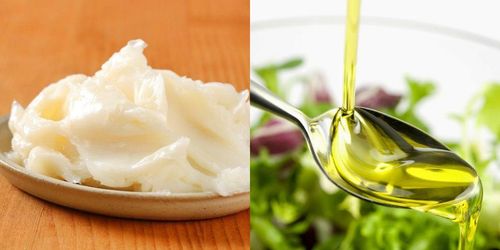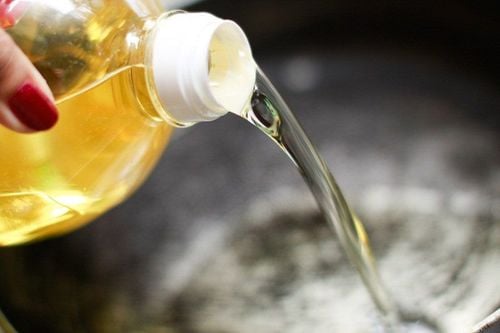This is an automatically translated article.
Cooking oil is an indispensable food in every family meal. There are many types of cooking oil on the market, but how to choose the right cooking oil?
1. Types of cooking oils
The body needs fat but fat is very high in calories. A gram of fat provides the body with up to 9 calories while a gram of protein or a gram of starch provides the body with only 4 calories. Therefore, it is necessary to determine the amount of fat provided to the body in a reasonable way.
Each type of cooking oil contains different chemical components. Some types are suitable for stir-fries, some are suitable for fried foods, while others are better suited to salad dressings. When cooking, always keep a concept called the oil's smoke point in mind. That is the temperature at which the oil begins to smoke and create substances that are harmful to the body. The more refined the oil, the higher the smoke point.
Here are some popular cooking oils:
Almond oil : If you are looking for an oil with a special and attractive flavor for dishes, almond oil will be the first choice. They taste great and are low in saturated fat, making them perfect for frying, fritters and salads. Studies have shown that following a diet rich in almonds can help prevent the risk of high blood pressure.

Bổ sung nhiều hạnh nhân trong bữa ăn giúp ngăn ngừa nguy cơ tăng huyết áp
Avocado Oil: A diet rich in avocados may offer many of the same cholesterol-regulating benefits as olive oil. Whole avocado contains a lot of magnesium and potassium, which helps the body balance sodium in the blood, thereby reducing blood pressure in people with high blood pressure. Like almond oil, avocado oil is suitable for frying, frying and salads. Canola Oil: Canola oil does not contain as many omega 3s as extra virgin olive oil, but it is one of the lowest saturated fats in cooking oils. Canola oil is especially beneficial for people with cardiovascular diseases such as valvular heart disease, congenital heart disease, arrhythmia, atherosclerosis, aortic aneurysm. ... Dishes suitable for this type of oil include baked, cooked or sautéed dishes. Coconut Oil: One of the best-tasting cooking oils. However, coconut oil contains very high levels of saturated fat, which is the cause of cardiovascular diseases if used in excess. Therefore, people rarely use coconut oil in cooking everyday dishes than other vegetable oils such as olive oil, canola oil. Coconut oil can be added in small amounts to stir-fries, baked goods or sauces to add more appeal to dishes. Seed Oil: Oil extracted from nuts such as walnuts, pumpkins, pecans, etc. has been shown to be safe, beneficial for the cardiovascular system and very good for cooking. However, these oils are often relatively expensive and are not commonly sold. Flaxseed and wheat oils: Like olive oil, flaxseed and wheat oils are rich in omega 3 and omega 6, which are especially good for the cardiovascular system. People often use these oils for salad dressings or dipping sauces.

Dầu hạt lanh chứa nhiều chất tốt cho hệ tim mạch
2. Olive oil
Olive oil has been proven to have many effects on human health and is widely used around the world. However, how should olive oil be used and in what cases should it be avoided? The answer will be shortly.
2.1 The role of olive oil Prevent cancer : The composition of olive oil helps to neutralize free radicals thereby effective in preventing the formation of cancer cells. Women who use a lot of olive oil in their meals have a lower risk of breast cancer than others. Prevention of cardiovascular diseases: Omega 3 and omega 6 in olive oil have vasodilating effects, increasing the week. complete, avoiding cholesterol deposition in the vessel wall. Therefore, people in the Mediterranean often have less heart-related diseases than other regions because their meals contain a lot of olive oil. Treatment for people with constipation: Taking olive oil directly can help increase bowel movements, soften stools for easy elimination in people with constipation. Support for the treatment of diabetes: People who consume 15 to 20 grams of olive oil per day have a lower risk of diabetes. Olive oil helps control blood sugar in people who already have diabetes. Helps control blood cholesterol: Using olive oil in daily meals in place of other saturated fats can reduce total cholesterol in people with high cholesterol. Use for hypertension: Many studies have demonstrated that adding a sufficient amount of extra virgin olive oil to the daily diet combined with strict adherence to the applicable treatment methods can help control blood pressure. control blood pressure readings in less than 6 months in people with hypertension.

Dầu oliu có nhiều tác dụng đối với sức khỏe con người
2.2 Under what circumstances should olive oil be avoided? The following cases should not use olive oil:
Earwax : Do not use olive oil to soften earwax Middle ear infection : Olive oil has a very good anti-inflammatory effect, but experts recommend not Use olive oil in case of otitis media especially in children. Allergy to components contained in olive oil Limit use to pregnant and lactating mothers. In addition, olive oil has not been shown to help in certain conditions, such as:
Eczema : Early research suggests that using a mixture of honey, beeswax, and olive oil may work in improve eczema skin. However, the role of olive oil in this method is very limited. Enhance memory and thinking: There are no studies to prove this. However, middle-aged women who used cooking olive oil seemed to have an improvement in cognitive thinking compared to those who used other cooking oils. Respiratory tract infections: Taking essential oils extracted from olive leaves does not help prevent flu. Migraines: Taking olive oil daily for 2 months might reduce the frequency and severity of migraines. However, there is no official research to confirm this source of information.

Nên sử dụng dầu oliu đúng cách để mang lại hiệu quả tốt nhất
Support weight loss diet: Using olive oil can help reduce the amount of fat in the body, but in general, the user's weight does not change. Ovarian cancer: Not many studies have shown that women who use olive oil have a lower risk of ovarian cancer than those who do not use it. Periodontitis also known as gum infection: Using olive oil has the ability to reduce the accumulation of plaque and prevent bleeding and inflammation of the gums. Stretch marks: Applying olive oil to stretch marks caused by weight gain during pregnancy does not help alleviate this condition. Cooking oil is an essential food, indispensable in every person's daily meal. There are many different types of cooking oil to suit the needs as well as the processing of each type of dish such as: avocado oil and almond oil are suitable for fried, fried or salad dishes while canola oil and coconut oil are often used. added to baked, sautéed dishes.... Olive oil is proven to be safe and healthy, but experts also recommend not to use olive oil in the following cases: allergic to ingredients part of the oil, pregnant or nursing mothers or treating otitis media in children....
To register for examination and treatment at Vinmec International General Hospital, you can contact us at Hotline Vinmec Health System nationwide, or register online HERE.
Reference source: webmd.com













